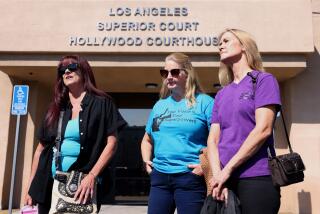IRS Demands $100,000 From Man Who Ran Sex Service : Taxes: Agency says Henry Hardy Jr. owes money for 1,912 sessions by prostitutes in his employ during 1988 and ’89. He has filed for bankruptcy protection.
- Share via
WASHINGTON — The Internal Revenue Service is seeking nearly $100,000 in back taxes and penalties from a Ventura County man who was imprisoned in 1991 for running what prosecutors deemed the county’s largest prostitution ring, according to documents filed in U. S. Tax Court here.
But Henry Hardy Jr., who was convicted of three counts of pimping and eight counts of pandering in 1991 in connection with his Stardust Modeling Agency in Oxnard, disputes the IRS figures, accusing the agency of engaging in “voodoo economics.” He says the IRS is after money he doesn’t have, and he has filed for bankruptcy to avoid paying the government any more taxes.
To come up with the tax debt, the IRS estimated that the prostitutes in Hardy’s employ conducted 1,912 sexual liaisons at a half-hour rate of between $80 and $100 during 1988 and 1989. The calculations were based on evidence from Hardy’s 1991 trial in Ventura County Superior Court, including business records and testimony from several prostitutes and a customer.
“When I was arrested, the police took this calendar and they considered marks on the calendar to be money,” Hardy said in an interview. “They came up with a calculation based on the calendar, but that calculation is wrong.”
The IRS stands by its estimate.
“We frequently need to reconstruct the amount of income we believe people or businesses did receive,” IRS spokesman Keith Kimball said. “We sometimes get bank records. When that isn’t possible, we use indirect methods. We can’t just pick a figure out of the air.”
The tax debt--$53,774 in taxes and $37,910 in penalties, according to the IRS--is the most recent in a string of woes for the 40-year-old Hardy.
He has already lost his $265,000 Oxnard home, which was seized by the county after prosecutors argued that it was purchased with illegal gains. And he served 16 months in prison, a term that was reduced from six years in a deal with prosecutors.
It was in April, 1993, while Hardy was an inmate at the California Correctional Institution in Tehachapi, that he received the demand for payment from the IRS.
“I’ve asked them to leave me alone,” Hardy said. “I’ve lost my home. I’ve lost my marriage. I don’t have any money. But they say they are pressing ahead. To me, this is like overkill.”
The IRS, which declined comment on the specifics of Hardy’s case, says in court documents that the roughly one dozen women working for Hardy charged customers $80 for each of the 144 half-hour sessions conducted between Jan. 1 and April 10, 1988. Hardy received a $40 cut.
Hardy’s share increased to $50 for each of the 1,921 sessions conducted between April 11, 1988, and July 31, 1989, the IRS says. The rates went up from $80 to $100 per half an hour from Aug. 1, 1989, to the end of 1989, and Hardy took $70 for each of the 847 sessions, according to the IRS.
The IRS allowed Hardy to deduct as labor costs the women’s portion of the payments, but the agency accuses Hardy of fraudulently reporting his share.
“Petitioner’s failure to report all income received in 1988 and 1989 on his Forms 1040 is due to fraud,” IRS attorney Thomas E. Carter declared in court documents.
Hardy, who now lives in Oxnard, is acting as his own attorney in the case. He has accused the IRS of faulty calculations and of working with law enforcement officials “to intentionally destroy any chance of my being a productive citizen of this country.”
He has formally appealed the IRS demand, sending the dispute to U. S. Tax Court in Los Angeles. He already appeared before the court, which resolves disagreements between taxpayers and the government, three times last fall, successfully delaying collection of the debts.
To postpone the matter further, Hardy filed for bankruptcy last year, contending that the money he earned while running the Stardust Modeling Agency is gone. Hardy, who is unemployed, has also argued in court that the Oxnard Police Department has destroyed his business records, which were seized as evidence, making it impossible for him to back up all his claims.
Hardy and the IRS will return to court in Los Angeles in early January for a formal trial on the tax debt.
Hardy, for his part, has had some success in taking on the government in the past. He filed an appeal of his conviction, saying that he, a black man, was the only person prosecuted among several people arrested during a 1991 sweep of prostitution businesses. The others were white.
Without passing judgment on the merits of Hardy’s claim, the state Court of Appeal ruled in 1993 that Hardy should have been allowed to pursue his claims of racism as part of his defense. Prosecutors agreed to grant Hardy an early release from prison in exchange for dropping the racism charge.
As part of that deal, Hardy pleaded guilty to the same pandering and pimping charges and signed a statement saying the Ventura County district attorney’s office “did not engage in discriminatory or selective prosecution in the filing of these charges against me.”
But in his dispute with the IRS, Hardy has again raised the discrimination issue, saying he was pressured into the deal. He refers to his female employees as dancers, not prostitutes.
More to Read
Sign up for Essential California
The most important California stories and recommendations in your inbox every morning.
You may occasionally receive promotional content from the Los Angeles Times.













